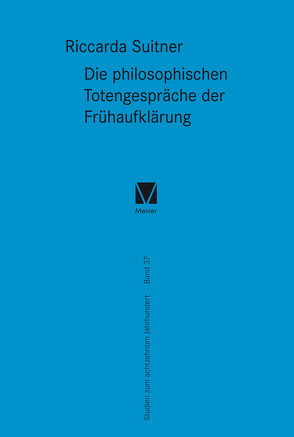
Dieses Buch rekonstruiert erstmals die faszinierende Geschichte einer Reihe fiktiver Totengespräche, die zwischen 1729 und 1734 – anonym oder unter Pseudonym und sämtlich als Flugschriften veröffentlicht – in Deutschland erschienenen sind. Die Protagonisten dieser Gespräche gehören zu den berühmtesten Denkern der Frühaufklärung (u. a. Chr. Thomasius, A. H. Francke, J. Fr. Budde, N. H. Gundling) und Philosophen des 17. Jahrhunderts (Descartes, Leibniz, Bekker). In den fünf Jahren, in denen die Dialoge erschienen, lösten sie auf verschiedenen Feldern (philosophischen, theologischen, ökonomischen, persönlichen) scharfe Kontroversen aus. Die Wechselbeziehungen zwischen allen Texten und häufig sogar ihre Existenz waren bisher jedoch völlig unbekannt.
Die Arbeit weist die Zuordnung der untersuchten Dialoge zu einem einzigen, einheitlichen Korpus von Totengesprächen nach, rekonstruiert ihre Genese, interpretiert die in den Gesprächen inszenierten Kontroversen, widerlegt die – lange angenommene – Verfasserschaft des sächsischen Journalisten David Fassmann und versucht, dem Umfeld der Autoren anonymer philosophischer Flugschriften auf die Spur zu kommen. Die Integration von gewöhnlich getrennten Forschungsfeldern (clandestine Literatur, Anonymität, Flugpublizistik, philosophischer Dialog) und die Aufmerksamkeit für Kreise, die sich »am Rande« des universitären Establishments befanden, eröffnen neue Perspektiven auf die Debatten und Strömungen der deutschen Frühaufklärung.
This book reconstructs the history of a set of »dialogues of the dead” published in Germany between 1729 and 1734. The protagonists of the texts, all published anonymously or under pseudonyms, include some of the most famous philosophers of the 17th century (René Descartes, Gottfried W. Leibniz, Balthasar Bekker), alongside German philosophers and theologians of the early 18th century (Christian Thomasius, August Hermann Francke, Johann Franz Budde, Nikolaus Hieronymus Gundling, Andreas Rüdiger, Johann Friedrich Mayer, Johann Wilhelm Petersen), for the most part or strongly influenced by Pietism. During the five years in which the dialogues appeared, the texts triggered a heated debate on several levels: philosophical, theological, economic and personal. For several reasons, the reciprocal connection between these dialogues – and often their mere existence – has remained unknown. The published dialogues are currently scattered among German libraries, often bound together with unrelated contemporary texts. Since their authors sold the texts as Flugschriften (unbound cheap prints), they only survive in few copies until today, as they were not intended for careful preservation in private libraries. In rare cases the dialogues are mentioned in scholarly studies and bibliographies, and then they are almost always attributed to the Saxon journalist David Fassmann, at the time the most famous German author of dialogues of the dead.
The author of this study demonstrates that these dialogues form a coherent corpus, reconstructs their composition, and interprets the controversies ‘staged’ by the authors of the texts using the fictitious protagonists. Research on the philosophical and theological underground of early 18th-century universities in Central Germany resulted in refuting Fassmann’s authorship of all texts, establishing a relationship between the symbolic illustrations and the content of the texts and shedding some light on the concrete interactions between engravers, university circles, authors, and publishers in the early German Enlightenment.
The book shows how the integration of usually separate research fields (clandestine literature, anonymity, ‘street literature’, philosophical dialogue) and the attention to social groups placed at the fringe of the ‘established’ German academic milieus (students, engravers) could contribute to the telling of several vicissitudes of the German Enlightenment from a new perspective.
Aktualisiert: 2023-06-16
> findR *
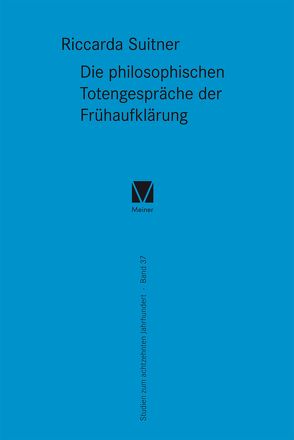
Dieses Buch rekonstruiert erstmals die faszinierende Geschichte einer Reihe fiktiver Totengespräche, die zwischen 1729 und 1734 – anonym oder unter Pseudonym und sämtlich als Flugschriften veröffentlicht – in Deutschland erschienenen sind. Die Protagonisten dieser Gespräche gehören zu den berühmtesten Denkern der Frühaufklärung (u. a. Chr. Thomasius, A. H. Francke, J. Fr. Budde, N. H. Gundling) und Philosophen des 17. Jahrhunderts (Descartes, Leibniz, Bekker). In den fünf Jahren, in denen die Dialoge erschienen, lösten sie auf verschiedenen Feldern (philosophischen, theologischen, ökonomischen, persönlichen) scharfe Kontroversen aus. Die Wechselbeziehungen zwischen allen Texten und häufig sogar ihre Existenz waren bisher jedoch völlig unbekannt.
Die Arbeit weist die Zuordnung der untersuchten Dialoge zu einem einzigen, einheitlichen Korpus von Totengesprächen nach, rekonstruiert ihre Genese, interpretiert die in den Gesprächen inszenierten Kontroversen, widerlegt die – lange angenommene – Verfasserschaft des sächsischen Journalisten David Fassmann und versucht, dem Umfeld der Autoren anonymer philosophischer Flugschriften auf die Spur zu kommen. Die Integration von gewöhnlich getrennten Forschungsfeldern (clandestine Literatur, Anonymität, Flugpublizistik, philosophischer Dialog) und die Aufmerksamkeit für Kreise, die sich »am Rande« des universitären Establishments befanden, eröffnen neue Perspektiven auf die Debatten und Strömungen der deutschen Frühaufklärung.
This book reconstructs the history of a set of »dialogues of the dead” published in Germany between 1729 and 1734. The protagonists of the texts, all published anonymously or under pseudonyms, include some of the most famous philosophers of the 17th century (René Descartes, Gottfried W. Leibniz, Balthasar Bekker), alongside German philosophers and theologians of the early 18th century (Christian Thomasius, August Hermann Francke, Johann Franz Budde, Nikolaus Hieronymus Gundling, Andreas Rüdiger, Johann Friedrich Mayer, Johann Wilhelm Petersen), for the most part or strongly influenced by Pietism. During the five years in which the dialogues appeared, the texts triggered a heated debate on several levels: philosophical, theological, economic and personal. For several reasons, the reciprocal connection between these dialogues – and often their mere existence – has remained unknown. The published dialogues are currently scattered among German libraries, often bound together with unrelated contemporary texts. Since their authors sold the texts as Flugschriften (unbound cheap prints), they only survive in few copies until today, as they were not intended for careful preservation in private libraries. In rare cases the dialogues are mentioned in scholarly studies and bibliographies, and then they are almost always attributed to the Saxon journalist David Fassmann, at the time the most famous German author of dialogues of the dead.
The author of this study demonstrates that these dialogues form a coherent corpus, reconstructs their composition, and interprets the controversies ‘staged’ by the authors of the texts using the fictitious protagonists. Research on the philosophical and theological underground of early 18th-century universities in Central Germany resulted in refuting Fassmann’s authorship of all texts, establishing a relationship between the symbolic illustrations and the content of the texts and shedding some light on the concrete interactions between engravers, university circles, authors, and publishers in the early German Enlightenment.
The book shows how the integration of usually separate research fields (clandestine literature, anonymity, ‘street literature’, philosophical dialogue) and the attention to social groups placed at the fringe of the ‘established’ German academic milieus (students, engravers) could contribute to the telling of several vicissitudes of the German Enlightenment from a new perspective.
Aktualisiert: 2023-06-14
> findR *
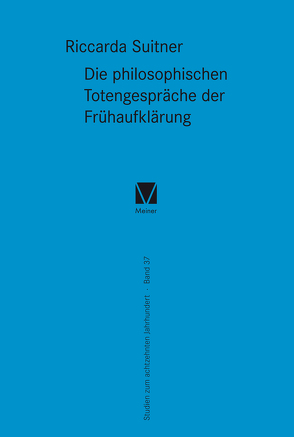
Dieses Buch rekonstruiert erstmals die faszinierende Geschichte einer Reihe fiktiver Totengespräche, die zwischen 1729 und 1734 – anonym oder unter Pseudonym und sämtlich als Flugschriften veröffentlicht – in Deutschland erschienenen sind. Die Protagonisten dieser Gespräche gehören zu den berühmtesten Denkern der Frühaufklärung (u. a. Chr. Thomasius, A. H. Francke, J. Fr. Budde, N. H. Gundling) und Philosophen des 17. Jahrhunderts (Descartes, Leibniz, Bekker). In den fünf Jahren, in denen die Dialoge erschienen, lösten sie auf verschiedenen Feldern (philosophischen, theologischen, ökonomischen, persönlichen) scharfe Kontroversen aus. Die Wechselbeziehungen zwischen allen Texten und häufig sogar ihre Existenz waren bisher jedoch völlig unbekannt.
Die Arbeit weist die Zuordnung der untersuchten Dialoge zu einem einzigen, einheitlichen Korpus von Totengesprächen nach, rekonstruiert ihre Genese, interpretiert die in den Gesprächen inszenierten Kontroversen, widerlegt die – lange angenommene – Verfasserschaft des sächsischen Journalisten David Fassmann und versucht, dem Umfeld der Autoren anonymer philosophischer Flugschriften auf die Spur zu kommen. Die Integration von gewöhnlich getrennten Forschungsfeldern (clandestine Literatur, Anonymität, Flugpublizistik, philosophischer Dialog) und die Aufmerksamkeit für Kreise, die sich »am Rande« des universitären Establishments befanden, eröffnen neue Perspektiven auf die Debatten und Strömungen der deutschen Frühaufklärung.
This book reconstructs the history of a set of »dialogues of the dead” published in Germany between 1729 and 1734. The protagonists of the texts, all published anonymously or under pseudonyms, include some of the most famous philosophers of the 17th century (René Descartes, Gottfried W. Leibniz, Balthasar Bekker), alongside German philosophers and theologians of the early 18th century (Christian Thomasius, August Hermann Francke, Johann Franz Budde, Nikolaus Hieronymus Gundling, Andreas Rüdiger, Johann Friedrich Mayer, Johann Wilhelm Petersen), for the most part or strongly influenced by Pietism. During the five years in which the dialogues appeared, the texts triggered a heated debate on several levels: philosophical, theological, economic and personal. For several reasons, the reciprocal connection between these dialogues – and often their mere existence – has remained unknown. The published dialogues are currently scattered among German libraries, often bound together with unrelated contemporary texts. Since their authors sold the texts as Flugschriften (unbound cheap prints), they only survive in few copies until today, as they were not intended for careful preservation in private libraries. In rare cases the dialogues are mentioned in scholarly studies and bibliographies, and then they are almost always attributed to the Saxon journalist David Fassmann, at the time the most famous German author of dialogues of the dead.
The author of this study demonstrates that these dialogues form a coherent corpus, reconstructs their composition, and interprets the controversies ‘staged’ by the authors of the texts using the fictitious protagonists. Research on the philosophical and theological underground of early 18th-century universities in Central Germany resulted in refuting Fassmann’s authorship of all texts, establishing a relationship between the symbolic illustrations and the content of the texts and shedding some light on the concrete interactions between engravers, university circles, authors, and publishers in the early German Enlightenment.
The book shows how the integration of usually separate research fields (clandestine literature, anonymity, ‘street literature’, philosophical dialogue) and the attention to social groups placed at the fringe of the ‘established’ German academic milieus (students, engravers) could contribute to the telling of several vicissitudes of the German Enlightenment from a new perspective.
Aktualisiert: 2023-05-21
> findR *
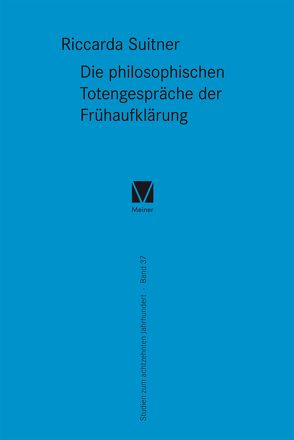
Dieses Buch rekonstruiert erstmals die faszinierende Geschichte einer Reihe fiktiver Totengespräche, die zwischen 1729 und 1734 – anonym oder unter Pseudonym und sämtlich als Flugschriften veröffentlicht – in Deutschland erschienenen sind. Die Protagonisten dieser Gespräche gehören zu den berühmtesten Denkern der Frühaufklärung (u. a. Chr. Thomasius, A. H. Francke, J. Fr. Budde, N. H. Gundling) und Philosophen des 17. Jahrhunderts (Descartes, Leibniz, Bekker). In den fünf Jahren, in denen die Dialoge erschienen, lösten sie auf verschiedenen Feldern (philosophischen, theologischen, ökonomischen, persönlichen) scharfe Kontroversen aus. Die Wechselbeziehungen zwischen allen Texten und häufig sogar ihre Existenz waren bisher jedoch völlig unbekannt.
Die Arbeit weist die Zuordnung der untersuchten Dialoge zu einem einzigen, einheitlichen Korpus von Totengesprächen nach, rekonstruiert ihre Genese, interpretiert die in den Gesprächen inszenierten Kontroversen, widerlegt die – lange angenommene – Verfasserschaft des sächsischen Journalisten David Fassmann und versucht, dem Umfeld der Autoren anonymer philosophischer Flugschriften auf die Spur zu kommen. Die Integration von gewöhnlich getrennten Forschungsfeldern (clandestine Literatur, Anonymität, Flugpublizistik, philosophischer Dialog) und die Aufmerksamkeit für Kreise, die sich »am Rande« des universitären Establishments befanden, eröffnen neue Perspektiven auf die Debatten und Strömungen der deutschen Frühaufklärung.
This book reconstructs the history of a set of »dialogues of the dead” published in Germany between 1729 and 1734. The protagonists of the texts, all published anonymously or under pseudonyms, include some of the most famous philosophers of the 17th century (René Descartes, Gottfried W. Leibniz, Balthasar Bekker), alongside German philosophers and theologians of the early 18th century (Christian Thomasius, August Hermann Francke, Johann Franz Budde, Nikolaus Hieronymus Gundling, Andreas Rüdiger, Johann Friedrich Mayer, Johann Wilhelm Petersen), for the most part or strongly influenced by Pietism. During the five years in which the dialogues appeared, the texts triggered a heated debate on several levels: philosophical, theological, economic and personal. For several reasons, the reciprocal connection between these dialogues – and often their mere existence – has remained unknown. The published dialogues are currently scattered among German libraries, often bound together with unrelated contemporary texts. Since their authors sold the texts as Flugschriften (unbound cheap prints), they only survive in few copies until today, as they were not intended for careful preservation in private libraries. In rare cases the dialogues are mentioned in scholarly studies and bibliographies, and then they are almost always attributed to the Saxon journalist David Fassmann, at the time the most famous German author of dialogues of the dead.
The author of this study demonstrates that these dialogues form a coherent corpus, reconstructs their composition, and interprets the controversies ‘staged’ by the authors of the texts using the fictitious protagonists. Research on the philosophical and theological underground of early 18th-century universities in Central Germany resulted in refuting Fassmann’s authorship of all texts, establishing a relationship between the symbolic illustrations and the content of the texts and shedding some light on the concrete interactions between engravers, university circles, authors, and publishers in the early German Enlightenment.
The book shows how the integration of usually separate research fields (clandestine literature, anonymity, ‘street literature’, philosophical dialogue) and the attention to social groups placed at the fringe of the ‘established’ German academic milieus (students, engravers) could contribute to the telling of several vicissitudes of the German Enlightenment from a new perspective.
Aktualisiert: 2023-05-21
> findR *
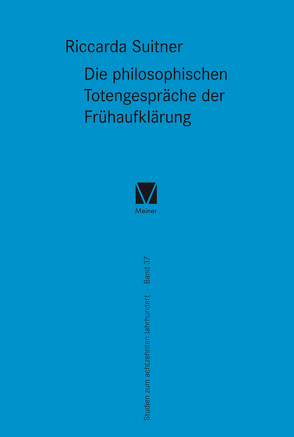
Dieses Buch rekonstruiert erstmals die faszinierende Geschichte einer Reihe fiktiver Totengespräche, die zwischen 1729 und 1734 – anonym oder unter Pseudonym und sämtlich als Flugschriften veröffentlicht – in Deutschland erschienenen sind. Die Protagonisten dieser Gespräche gehören zu den berühmtesten Denkern der Frühaufklärung (u. a. Chr. Thomasius, A. H. Francke, J. Fr. Budde, N. H. Gundling) und Philosophen des 17. Jahrhunderts (Descartes, Leibniz, Bekker). In den fünf Jahren, in denen die Dialoge erschienen, lösten sie auf verschiedenen Feldern (philosophischen, theologischen, ökonomischen, persönlichen) scharfe Kontroversen aus. Die Wechselbeziehungen zwischen allen Texten und häufig sogar ihre Existenz waren bisher jedoch völlig unbekannt.
Die Arbeit weist die Zuordnung der untersuchten Dialoge zu einem einzigen, einheitlichen Korpus von Totengesprächen nach, rekonstruiert ihre Genese, interpretiert die in den Gesprächen inszenierten Kontroversen, widerlegt die – lange angenommene – Verfasserschaft des sächsischen Journalisten David Fassmann und versucht, dem Umfeld der Autoren anonymer philosophischer Flugschriften auf die Spur zu kommen. Die Integration von gewöhnlich getrennten Forschungsfeldern (clandestine Literatur, Anonymität, Flugpublizistik, philosophischer Dialog) und die Aufmerksamkeit für Kreise, die sich »am Rande« des universitären Establishments befanden, eröffnen neue Perspektiven auf die Debatten und Strömungen der deutschen Frühaufklärung.
This book reconstructs the history of a set of »dialogues of the dead” published in Germany between 1729 and 1734. The protagonists of the texts, all published anonymously or under pseudonyms, include some of the most famous philosophers of the 17th century (René Descartes, Gottfried W. Leibniz, Balthasar Bekker), alongside German philosophers and theologians of the early 18th century (Christian Thomasius, August Hermann Francke, Johann Franz Budde, Nikolaus Hieronymus Gundling, Andreas Rüdiger, Johann Friedrich Mayer, Johann Wilhelm Petersen), for the most part or strongly influenced by Pietism. During the five years in which the dialogues appeared, the texts triggered a heated debate on several levels: philosophical, theological, economic and personal. For several reasons, the reciprocal connection between these dialogues – and often their mere existence – has remained unknown. The published dialogues are currently scattered among German libraries, often bound together with unrelated contemporary texts. Since their authors sold the texts as Flugschriften (unbound cheap prints), they only survive in few copies until today, as they were not intended for careful preservation in private libraries. In rare cases the dialogues are mentioned in scholarly studies and bibliographies, and then they are almost always attributed to the Saxon journalist David Fassmann, at the time the most famous German author of dialogues of the dead.
The author of this study demonstrates that these dialogues form a coherent corpus, reconstructs their composition, and interprets the controversies ‘staged’ by the authors of the texts using the fictitious protagonists. Research on the philosophical and theological underground of early 18th-century universities in Central Germany resulted in refuting Fassmann’s authorship of all texts, establishing a relationship between the symbolic illustrations and the content of the texts and shedding some light on the concrete interactions between engravers, university circles, authors, and publishers in the early German Enlightenment.
The book shows how the integration of usually separate research fields (clandestine literature, anonymity, ‘street literature’, philosophical dialogue) and the attention to social groups placed at the fringe of the ‘established’ German academic milieus (students, engravers) could contribute to the telling of several vicissitudes of the German Enlightenment from a new perspective.
Aktualisiert: 2023-05-19
> findR *
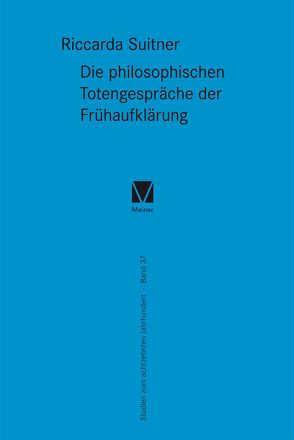
Dieses Buch rekonstruiert erstmals die faszinierende Geschichte einer Reihe fiktiver Totengespräche, die zwischen 1729 und 1734 – anonym oder unter Pseudonym und sämtlich als Flugschriften veröffentlicht – in Deutschland erschienenen sind. Die Protagonisten dieser Gespräche gehören zu den berühmtesten Denkern der Frühaufklärung (u. a. Chr. Thomasius, A. H. Francke, J. Fr. Budde, N. H. Gundling) und Philosophen des 17. Jahrhunderts (Descartes, Leibniz, Bekker). In den fünf Jahren, in denen die Dialoge erschienen, lösten sie auf verschiedenen Feldern (philosophischen, theologischen, ökonomischen, persönlichen) scharfe Kontroversen aus. Die Wechselbeziehungen zwischen allen Texten und häufig sogar ihre Existenz waren bisher jedoch völlig unbekannt.
Die Arbeit weist die Zuordnung der untersuchten Dialoge zu einem einzigen, einheitlichen Korpus von Totengesprächen nach, rekonstruiert ihre Genese, interpretiert die in den Gesprächen inszenierten Kontroversen, widerlegt die – lange angenommene – Verfasserschaft des sächsischen Journalisten David Fassmann und versucht, dem Umfeld der Autoren anonymer philosophischer Flugschriften auf die Spur zu kommen. Die Integration von gewöhnlich getrennten Forschungsfeldern (clandestine Literatur, Anonymität, Flugpublizistik, philosophischer Dialog) und die Aufmerksamkeit für Kreise, die sich »am Rande« des universitären Establishments befanden, eröffnen neue Perspektiven auf die Debatten und Strömungen der deutschen Frühaufklärung.
This book reconstructs the history of a set of »dialogues of the dead” published in Germany between 1729 and 1734. The protagonists of the texts, all published anonymously or under pseudonyms, include some of the most famous philosophers of the 17th century (René Descartes, Gottfried W. Leibniz, Balthasar Bekker), alongside German philosophers and theologians of the early 18th century (Christian Thomasius, August Hermann Francke, Johann Franz Budde, Nikolaus Hieronymus Gundling, Andreas Rüdiger, Johann Friedrich Mayer, Johann Wilhelm Petersen), for the most part or strongly influenced by Pietism. During the five years in which the dialogues appeared, the texts triggered a heated debate on several levels: philosophical, theological, economic and personal. For several reasons, the reciprocal connection between these dialogues – and often their mere existence – has remained unknown. The published dialogues are currently scattered among German libraries, often bound together with unrelated contemporary texts. Since their authors sold the texts as Flugschriften (unbound cheap prints), they only survive in few copies until today, as they were not intended for careful preservation in private libraries. In rare cases the dialogues are mentioned in scholarly studies and bibliographies, and then they are almost always attributed to the Saxon journalist David Fassmann, at the time the most famous German author of dialogues of the dead.
The author of this study demonstrates that these dialogues form a coherent corpus, reconstructs their composition, and interprets the controversies ‘staged’ by the authors of the texts using the fictitious protagonists. Research on the philosophical and theological underground of early 18th-century universities in Central Germany resulted in refuting Fassmann’s authorship of all texts, establishing a relationship between the symbolic illustrations and the content of the texts and shedding some light on the concrete interactions between engravers, university circles, authors, and publishers in the early German Enlightenment.
The book shows how the integration of usually separate research fields (clandestine literature, anonymity, ‘street literature’, philosophical dialogue) and the attention to social groups placed at the fringe of the ‘established’ German academic milieus (students, engravers) could contribute to the telling of several vicissitudes of the German Enlightenment from a new perspective.
Aktualisiert: 2023-05-19
> findR *
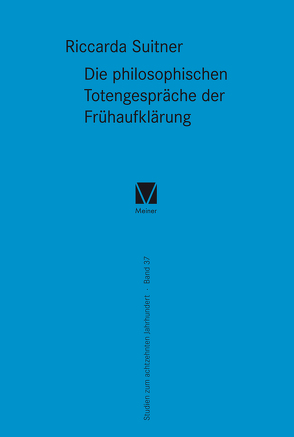
Dieses Buch rekonstruiert erstmals die faszinierende Geschichte einer Reihe fiktiver Totengespräche, die zwischen 1729 und 1734 – anonym oder unter Pseudonym und sämtlich als Flugschriften veröffentlicht – in Deutschland erschienenen sind. Die Protagonisten dieser Gespräche gehören zu den berühmtesten Denkern der Frühaufklärung (u. a. Chr. Thomasius, A. H. Francke, J. Fr. Budde, N. H. Gundling) und Philosophen des 17. Jahrhunderts (Descartes, Leibniz, Bekker). In den fünf Jahren, in denen die Dialoge erschienen, lösten sie auf verschiedenen Feldern (philosophischen, theologischen, ökonomischen, persönlichen) scharfe Kontroversen aus. Die Wechselbeziehungen zwischen allen Texten und häufig sogar ihre Existenz waren bisher jedoch völlig unbekannt.
Die Arbeit weist die Zuordnung der untersuchten Dialoge zu einem einzigen, einheitlichen Korpus von Totengesprächen nach, rekonstruiert ihre Genese, interpretiert die in den Gesprächen inszenierten Kontroversen, widerlegt die – lange angenommene – Verfasserschaft des sächsischen Journalisten David Fassmann und versucht, dem Umfeld der Autoren anonymer philosophischer Flugschriften auf die Spur zu kommen. Die Integration von gewöhnlich getrennten Forschungsfeldern (clandestine Literatur, Anonymität, Flugpublizistik, philosophischer Dialog) und die Aufmerksamkeit für Kreise, die sich »am Rande« des universitären Establishments befanden, eröffnen neue Perspektiven auf die Debatten und Strömungen der deutschen Frühaufklärung.
This book reconstructs the history of a set of »dialogues of the dead” published in Germany between 1729 and 1734. The protagonists of the texts, all published anonymously or under pseudonyms, include some of the most famous philosophers of the 17th century (René Descartes, Gottfried W. Leibniz, Balthasar Bekker), alongside German philosophers and theologians of the early 18th century (Christian Thomasius, August Hermann Francke, Johann Franz Budde, Nikolaus Hieronymus Gundling, Andreas Rüdiger, Johann Friedrich Mayer, Johann Wilhelm Petersen), for the most part or strongly influenced by Pietism. During the five years in which the dialogues appeared, the texts triggered a heated debate on several levels: philosophical, theological, economic and personal. For several reasons, the reciprocal connection between these dialogues – and often their mere existence – has remained unknown. The published dialogues are currently scattered among German libraries, often bound together with unrelated contemporary texts. Since their authors sold the texts as Flugschriften (unbound cheap prints), they only survive in few copies until today, as they were not intended for careful preservation in private libraries. In rare cases the dialogues are mentioned in scholarly studies and bibliographies, and then they are almost always attributed to the Saxon journalist David Fassmann, at the time the most famous German author of dialogues of the dead.
The author of this study demonstrates that these dialogues form a coherent corpus, reconstructs their composition, and interprets the controversies ‘staged’ by the authors of the texts using the fictitious protagonists. Research on the philosophical and theological underground of early 18th-century universities in Central Germany resulted in refuting Fassmann’s authorship of all texts, establishing a relationship between the symbolic illustrations and the content of the texts and shedding some light on the concrete interactions between engravers, university circles, authors, and publishers in the early German Enlightenment.
The book shows how the integration of usually separate research fields (clandestine literature, anonymity, ‘street literature’, philosophical dialogue) and the attention to social groups placed at the fringe of the ‘established’ German academic milieus (students, engravers) could contribute to the telling of several vicissitudes of the German Enlightenment from a new perspective.
Aktualisiert: 2023-05-17
> findR *
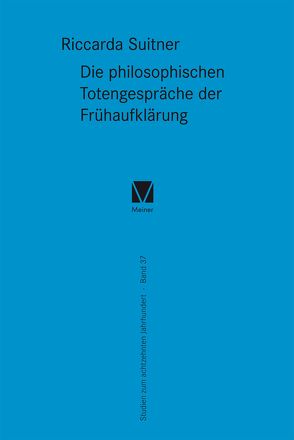
Dieses Buch rekonstruiert erstmals die faszinierende Geschichte einer Reihe fiktiver Totengespräche, die zwischen 1729 und 1734 – anonym oder unter Pseudonym und sämtlich als Flugschriften veröffentlicht – in Deutschland erschienenen sind. Die Protagonisten dieser Gespräche gehören zu den berühmtesten Denkern der Frühaufklärung (u. a. Chr. Thomasius, A. H. Francke, J. Fr. Budde, N. H. Gundling) und Philosophen des 17. Jahrhunderts (Descartes, Leibniz, Bekker). In den fünf Jahren, in denen die Dialoge erschienen, lösten sie auf verschiedenen Feldern (philosophischen, theologischen, ökonomischen, persönlichen) scharfe Kontroversen aus. Die Wechselbeziehungen zwischen allen Texten und häufig sogar ihre Existenz waren bisher jedoch völlig unbekannt.
Die Arbeit weist die Zuordnung der untersuchten Dialoge zu einem einzigen, einheitlichen Korpus von Totengesprächen nach, rekonstruiert ihre Genese, interpretiert die in den Gesprächen inszenierten Kontroversen, widerlegt die – lange angenommene – Verfasserschaft des sächsischen Journalisten David Fassmann und versucht, dem Umfeld der Autoren anonymer philosophischer Flugschriften auf die Spur zu kommen. Die Integration von gewöhnlich getrennten Forschungsfeldern (clandestine Literatur, Anonymität, Flugpublizistik, philosophischer Dialog) und die Aufmerksamkeit für Kreise, die sich »am Rande« des universitären Establishments befanden, eröffnen neue Perspektiven auf die Debatten und Strömungen der deutschen Frühaufklärung.
This book reconstructs the history of a set of »dialogues of the dead” published in Germany between 1729 and 1734. The protagonists of the texts, all published anonymously or under pseudonyms, include some of the most famous philosophers of the 17th century (René Descartes, Gottfried W. Leibniz, Balthasar Bekker), alongside German philosophers and theologians of the early 18th century (Christian Thomasius, August Hermann Francke, Johann Franz Budde, Nikolaus Hieronymus Gundling, Andreas Rüdiger, Johann Friedrich Mayer, Johann Wilhelm Petersen), for the most part or strongly influenced by Pietism. During the five years in which the dialogues appeared, the texts triggered a heated debate on several levels: philosophical, theological, economic and personal. For several reasons, the reciprocal connection between these dialogues – and often their mere existence – has remained unknown. The published dialogues are currently scattered among German libraries, often bound together with unrelated contemporary texts. Since their authors sold the texts as Flugschriften (unbound cheap prints), they only survive in few copies until today, as they were not intended for careful preservation in private libraries. In rare cases the dialogues are mentioned in scholarly studies and bibliographies, and then they are almost always attributed to the Saxon journalist David Fassmann, at the time the most famous German author of dialogues of the dead.
The author of this study demonstrates that these dialogues form a coherent corpus, reconstructs their composition, and interprets the controversies ‘staged’ by the authors of the texts using the fictitious protagonists. Research on the philosophical and theological underground of early 18th-century universities in Central Germany resulted in refuting Fassmann’s authorship of all texts, establishing a relationship between the symbolic illustrations and the content of the texts and shedding some light on the concrete interactions between engravers, university circles, authors, and publishers in the early German Enlightenment.
The book shows how the integration of usually separate research fields (clandestine literature, anonymity, ‘street literature’, philosophical dialogue) and the attention to social groups placed at the fringe of the ‘established’ German academic milieus (students, engravers) could contribute to the telling of several vicissitudes of the German Enlightenment from a new perspective.
Aktualisiert: 2023-05-17
> findR *
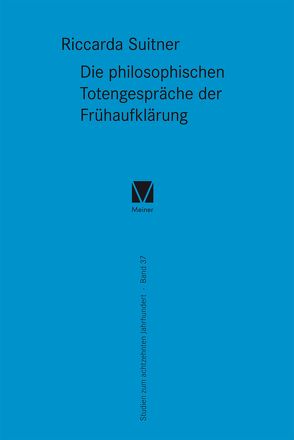
Dieses Buch rekonstruiert erstmals die faszinierende Geschichte einer Reihe fiktiver Totengespräche, die zwischen 1729 und 1734 – anonym oder unter Pseudonym und sämtlich als Flugschriften veröffentlicht – in Deutschland erschienenen sind. Die Protagonisten dieser Gespräche gehören zu den berühmtesten Denkern der Frühaufklärung (u. a. Chr. Thomasius, A. H. Francke, J. Fr. Budde, N. H. Gundling) und Philosophen des 17. Jahrhunderts (Descartes, Leibniz, Bekker). In den fünf Jahren, in denen die Dialoge erschienen, lösten sie auf verschiedenen Feldern (philosophischen, theologischen, ökonomischen, persönlichen) scharfe Kontroversen aus. Die Wechselbeziehungen zwischen allen Texten und häufig sogar ihre Existenz waren bisher jedoch völlig unbekannt.
Die Arbeit weist die Zuordnung der untersuchten Dialoge zu einem einzigen, einheitlichen Korpus von Totengesprächen nach, rekonstruiert ihre Genese, interpretiert die in den Gesprächen inszenierten Kontroversen, widerlegt die – lange angenommene – Verfasserschaft des sächsischen Journalisten David Fassmann und versucht, dem Umfeld der Autoren anonymer philosophischer Flugschriften auf die Spur zu kommen. Die Integration von gewöhnlich getrennten Forschungsfeldern (clandestine Literatur, Anonymität, Flugpublizistik, philosophischer Dialog) und die Aufmerksamkeit für Kreise, die sich »am Rande« des universitären Establishments befanden, eröffnen neue Perspektiven auf die Debatten und Strömungen der deutschen Frühaufklärung.
This book reconstructs the history of a set of »dialogues of the dead” published in Germany between 1729 and 1734. The protagonists of the texts, all published anonymously or under pseudonyms, include some of the most famous philosophers of the 17th century (René Descartes, Gottfried W. Leibniz, Balthasar Bekker), alongside German philosophers and theologians of the early 18th century (Christian Thomasius, August Hermann Francke, Johann Franz Budde, Nikolaus Hieronymus Gundling, Andreas Rüdiger, Johann Friedrich Mayer, Johann Wilhelm Petersen), for the most part or strongly influenced by Pietism. During the five years in which the dialogues appeared, the texts triggered a heated debate on several levels: philosophical, theological, economic and personal. For several reasons, the reciprocal connection between these dialogues – and often their mere existence – has remained unknown. The published dialogues are currently scattered among German libraries, often bound together with unrelated contemporary texts. Since their authors sold the texts as Flugschriften (unbound cheap prints), they only survive in few copies until today, as they were not intended for careful preservation in private libraries. In rare cases the dialogues are mentioned in scholarly studies and bibliographies, and then they are almost always attributed to the Saxon journalist David Fassmann, at the time the most famous German author of dialogues of the dead.
The author of this study demonstrates that these dialogues form a coherent corpus, reconstructs their composition, and interprets the controversies ‘staged’ by the authors of the texts using the fictitious protagonists. Research on the philosophical and theological underground of early 18th-century universities in Central Germany resulted in refuting Fassmann’s authorship of all texts, establishing a relationship between the symbolic illustrations and the content of the texts and shedding some light on the concrete interactions between engravers, university circles, authors, and publishers in the early German Enlightenment.
The book shows how the integration of usually separate research fields (clandestine literature, anonymity, ‘street literature’, philosophical dialogue) and the attention to social groups placed at the fringe of the ‘established’ German academic milieus (students, engravers) could contribute to the telling of several vicissitudes of the German Enlightenment from a new perspective.
Aktualisiert: 2023-03-19
> findR *
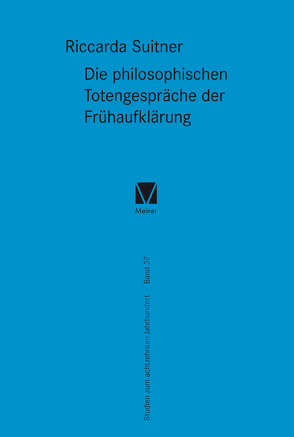
Dieses Buch rekonstruiert erstmals die faszinierende Geschichte einer Reihe fiktiver Totengespräche, die zwischen 1729 und 1734 – anonym oder unter Pseudonym und sämtlich als Flugschriften veröffentlicht – in Deutschland erschienenen sind. Die Protagonisten dieser Gespräche gehören zu den berühmtesten Denkern der Frühaufklärung (u. a. Chr. Thomasius, A. H. Francke, J. Fr. Budde, N. H. Gundling) und Philosophen des 17. Jahrhunderts (Descartes, Leibniz, Bekker). In den fünf Jahren, in denen die Dialoge erschienen, lösten sie auf verschiedenen Feldern (philosophischen, theologischen, ökonomischen, persönlichen) scharfe Kontroversen aus. Die Wechselbeziehungen zwischen allen Texten und häufig sogar ihre Existenz waren bisher jedoch völlig unbekannt.
Die Arbeit weist die Zuordnung der untersuchten Dialoge zu einem einzigen, einheitlichen Korpus von Totengesprächen nach, rekonstruiert ihre Genese, interpretiert die in den Gesprächen inszenierten Kontroversen, widerlegt die – lange angenommene – Verfasserschaft des sächsischen Journalisten David Fassmann und versucht, dem Umfeld der Autoren anonymer philosophischer Flugschriften auf die Spur zu kommen. Die Integration von gewöhnlich getrennten Forschungsfeldern (clandestine Literatur, Anonymität, Flugpublizistik, philosophischer Dialog) und die Aufmerksamkeit für Kreise, die sich »am Rande« des universitären Establishments befanden, eröffnen neue Perspektiven auf die Debatten und Strömungen der deutschen Frühaufklärung.
This book reconstructs the history of a set of »dialogues of the dead” published in Germany between 1729 and 1734. The protagonists of the texts, all published anonymously or under pseudonyms, include some of the most famous philosophers of the 17th century (René Descartes, Gottfried W. Leibniz, Balthasar Bekker), alongside German philosophers and theologians of the early 18th century (Christian Thomasius, August Hermann Francke, Johann Franz Budde, Nikolaus Hieronymus Gundling, Andreas Rüdiger, Johann Friedrich Mayer, Johann Wilhelm Petersen), for the most part or strongly influenced by Pietism. During the five years in which the dialogues appeared, the texts triggered a heated debate on several levels: philosophical, theological, economic and personal. For several reasons, the reciprocal connection between these dialogues – and often their mere existence – has remained unknown. The published dialogues are currently scattered among German libraries, often bound together with unrelated contemporary texts. Since their authors sold the texts as Flugschriften (unbound cheap prints), they only survive in few copies until today, as they were not intended for careful preservation in private libraries. In rare cases the dialogues are mentioned in scholarly studies and bibliographies, and then they are almost always attributed to the Saxon journalist David Fassmann, at the time the most famous German author of dialogues of the dead.
The author of this study demonstrates that these dialogues form a coherent corpus, reconstructs their composition, and interprets the controversies ‘staged’ by the authors of the texts using the fictitious protagonists. Research on the philosophical and theological underground of early 18th-century universities in Central Germany resulted in refuting Fassmann’s authorship of all texts, establishing a relationship between the symbolic illustrations and the content of the texts and shedding some light on the concrete interactions between engravers, university circles, authors, and publishers in the early German Enlightenment.
The book shows how the integration of usually separate research fields (clandestine literature, anonymity, ‘street literature’, philosophical dialogue) and the attention to social groups placed at the fringe of the ‘established’ German academic milieus (students, engravers) could contribute to the telling of several vicissitudes of the German Enlightenment from a new perspective.
Aktualisiert: 2023-03-19
> findR *
MEHR ANZEIGEN
Bücher von Suitner, Riccarda
Sie suchen ein Buch oder Publikation vonSuitner, Riccarda ? Bei Buch findr finden Sie alle Bücher Suitner, Riccarda.
Entdecken Sie neue Bücher oder Klassiker für Sie selbst oder zum Verschenken. Buch findr hat zahlreiche Bücher
von Suitner, Riccarda im Sortiment. Nehmen Sie sich Zeit zum Stöbern und finden Sie das passende Buch oder die
Publiketion für Ihr Lesevergnügen oder Ihr Interessensgebiet. Stöbern Sie durch unser Angebot und finden Sie aus
unserer großen Auswahl das Buch, das Ihnen zusagt. Bei Buch findr finden Sie Romane, Ratgeber, wissenschaftliche und
populärwissenschaftliche Bücher uvm. Bestellen Sie Ihr Buch zu Ihrem Thema einfach online und lassen Sie es sich
bequem nach Hause schicken. Wir wünschen Ihnen schöne und entspannte Lesemomente mit Ihrem Buch
von Suitner, Riccarda .
Suitner, Riccarda - Große Auswahl an Publikationen bei Buch findr
Bei uns finden Sie Bücher aller beliebter Autoren, Neuerscheinungen, Bestseller genauso wie alte Schätze. Bücher
von Suitner, Riccarda die Ihre Fantasie anregen und Bücher, die Sie weiterbilden und Ihnen wissenschaftliche Fakten
vermitteln. Ganz nach Ihrem Geschmack ist das passende Buch für Sie dabei. Finden Sie eine große Auswahl Bücher
verschiedenster Genres, Verlage, Schlagworte Genre bei Buchfindr:
Unser Repertoire umfasst Bücher von
- Suits, Johann
- Suits, Karolina
- Sujac, Ora
- Sujecki, Bartosz
- Sujiva, Bhante
- Sujka, Justyna
- Suk, Birgit
- Suk, Jan
- Suk, Joon-Hye
- Suk, Josef
Sie haben viele Möglichkeiten bei Buch findr die passenden Bücher für Ihr Lesevergnügen zu entdecken. Nutzen Sie
unsere Suchfunktionen, um zu stöbern und für Sie interessante Bücher in den unterschiedlichen Genres und Kategorien
zu finden. Neben Büchern von Suitner, Riccarda und Büchern aus verschiedenen Kategorien finden Sie schnell und
einfach auch eine Auflistung thematisch passender Publikationen. Probieren Sie es aus, legen Sie jetzt los! Ihrem
Lesevergnügen steht nichts im Wege. Nutzen Sie die Vorteile Ihre Bücher online zu kaufen und bekommen Sie die
bestellten Bücher schnell und bequem zugestellt. Nehmen Sie sich die Zeit, online die Bücher Ihrer Wahl anzulesen,
Buchempfehlungen und Rezensionen zu studieren, Informationen zu Autoren zu lesen. Viel Spaß beim Lesen wünscht Ihnen
das Team von Buchfindr.









